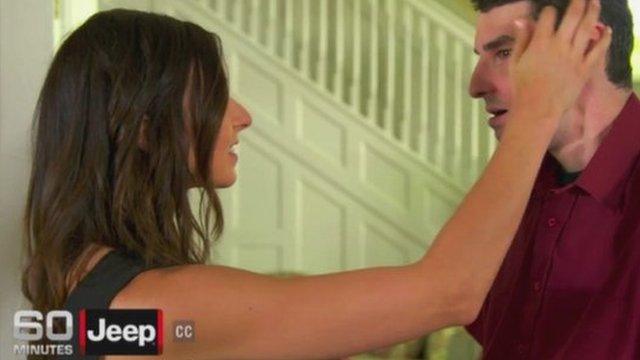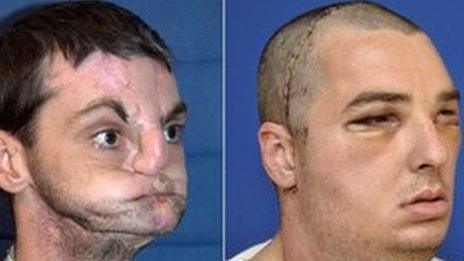Sister meets man with her brother's transplanted face
- Published
Footage from Channel 9 shows the moment that Rebekah Aversano sees - and touches - the face of her dead brother on another person for the first time
A woman, whose brother was killed in a traffic accident, has met the man who was given his face in a pioneering transplant operation.
Footage from Channel 9's 60 Minutes, external programme in Australia shows the moment Rebekah Aversano sees - and touches - the face of her dead brother.
The recipient, Richard Norris, from Virginia, US, was severely injured in a shotgun accident 15 years ago.
Until the operation he had rarely gone outside and lived as a recluse.
'Tragic loss'
Transplant recipients do not normally meet the families of their donors.
But Ms Aversano, from Maryland, came face to face with the man who received some of her brother's facial tissues and structures.
She touched his face and said: "This is the face I grew up with."
Her brother, Joshua Aversano, had been killed in a road traffic accident, at the age of 21.
The decision to donate his face had been difficult, but would have been what he wanted, said his mother Gwen Aversano in a separate interview with CTV News, external.
She said: "Knowing our son he would have wanted someone else to go on with their lives if he wasn't able to.
"After meeting Mr Norris, seeing him and speaking to him we can definitely see our son in him.
"We were just so pleased we were able to help Mr Norris even though we had such a tragic loss," she added.
The extensive transplant surgery took place at the University of Maryland three years ago. It lasted more than 36 hours.
Mr Norris had lost his lips and nose in a shotgun accident and had limited movement of his mouth.

Richard Norris lived as a recluse for 15 years after losing his nose, lips and teeth in a gun accident.
James Partridge, founder of the charity Changing Faces which supports people with facial disfigurements, told the BBC he did not know of another case where the family of the donor had met the person who had received the face.
And Mr Barry Jones, former president of the British Association of Aesthetic Plastic Surgeons, said there were many issues to consider.
"It must be rather difficult for any relative to meet a recipient but it must be particularly difficult for faces," he told the BBC.
"On this occasion it seems to have been a happy outcome. But that might not always be the case."
Mr Jones said a family would have to ponder how they would feel about the personality of the person with the new face.
"I am not against recipients meeting donor families if both parties want too, but I hope they have been counselled properly before their meeting," he said.
- Published29 May 2015

- Published28 March 2012
